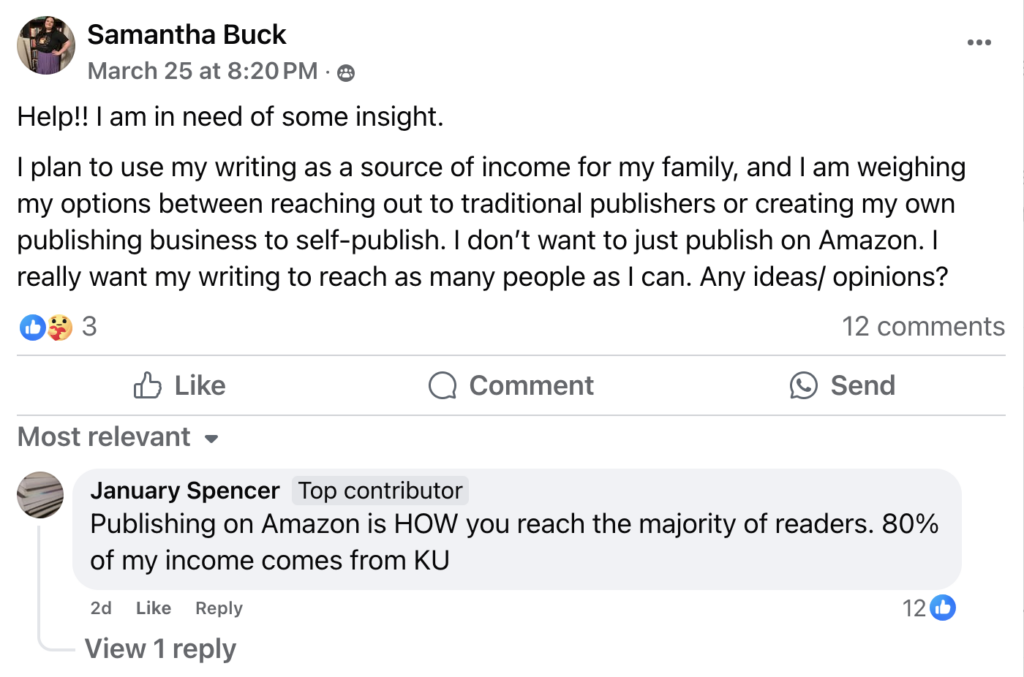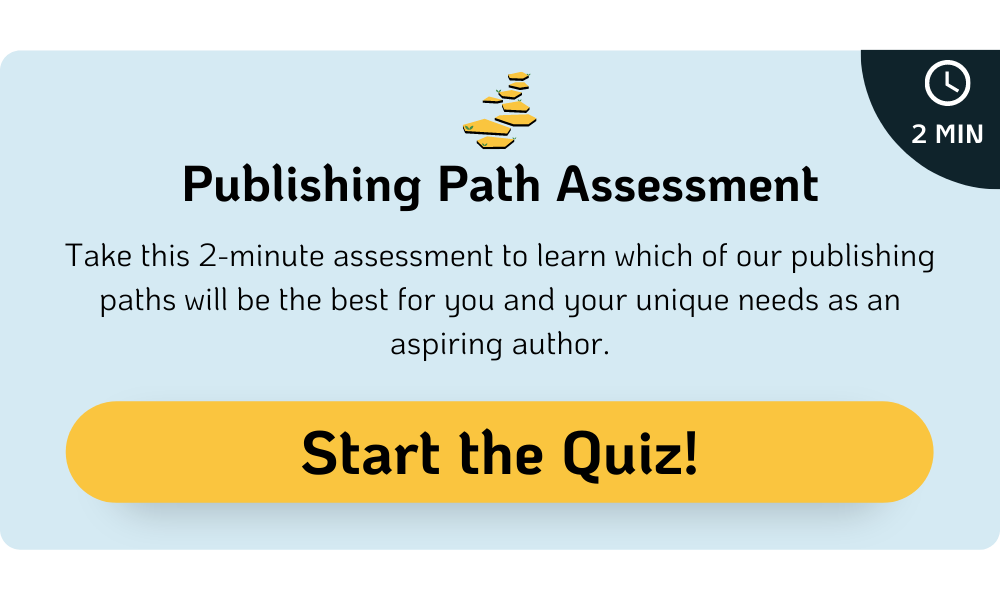One of the biggest decisions an author faces is whether to self-publish or find an agent and pursue a traditional publishing deal. Both paths have their advantages and challenges, and the best choice depends on your goals, resources, and level of commitment. If you’re wondering, Should I self-publish or find an agent?—I’ll help you figure out how to make the right choice.
For you. Because there is a right and wrong choice depending on who you are, what you want, and even your skill level as an author.
Do you start with self-publishing before finding an agent?
Or should you only query and save your work?
Here’s what you’ll learn when it comes to whether you should self-publish or find an agent:
Table of Contents
What’s the difference?
You may know this already, but the degree of differences might surprise you. Let’s take a look at the primary differences you’ll face in the choice to self-publish or find an agent.
Self-publishing
Self-publishing means you take full control over the publishing process, from editing and formatting to cover design, marketing, and distribution. You can publish your book through platforms like Amazon Kindle Direct Publishing (KDP), IngramSpark, or Draft2Digital.
Pros of Self-Publishing:
- Full Creative Control – You decide on the cover, formatting, pricing, and marketing strategy.
- Higher Royalties – Amazon KDP offers up to 70% royalties on ebook sales, compared to traditional publishing, where you typically earn 10-15% per book.
- Faster Time to Market – You can publish your book as soon as it’s ready, rather than waiting months (or years) to secure an agent and publishing deal.
- No Gatekeepers – You don’t have to wait for approval from a literary agent or publishing house.
Cons of Self-Publishing:
- Full Creative Control – Yes, it’s on both lists. Because many authors don’t understand how to properly choose the cover, formatting, pricing, and more. Unless you educate yourself extensively, or hire a company like selfpublishing.com, this can be a negative.
- Upfront Costs – You may need to invest in professional editing, cover design, and marketing. This can range from a few hundred to a few thousand depending on several factors.
- Marketing Responsibility – You are responsible for getting your book in front of readers.
- Limited Print Distribution – Bookstores are less likely to stock self-published books.
Finding a literary agent (traditional publishing)
A literary agent acts as a bridge between you and major publishing houses. They pitch your book to editors, negotiate contracts, and help manage your writing career. So you’ll have to think about these thing when deciding to self-publish or find an agent.
Notably, in order to traditionally publish with most reputable houses, you need an agent. They will not accept manuscripts without one.
Pros of Traditional Publishing:
- Access to Established Publishers – Agents help place your book with top publishers like Penguin Random House, HarperCollins, or Simon & Schuster.
- Professional Support – Your publisher will handle editing, cover design, and marketing to some extent.
- Advance Payments – Many traditional deals include an advance against future royalties.
- Bookstore Placement – Traditional publishers have established distribution channels.
- More Authority – While the self-publishing landscape is still changing and becoming reputable, readers often respect traditionally published books more, and therefore you’ll be held in higher esteem as an author by the general public before they’ve read your book.
Cons of Traditional Publishing:
- Long Wait Times – Securing an agent can take months or years, and even after landing a deal, your book may not hit shelves for another 1-2 years. And sometimes, you can spend so much time querying without ever landing an agent.
- Lower Royalties – Most traditionally published authors earn 10-15% in royalties, significantly lower than self-published authors.
- Loss of Creative Control – Publishers may change your title, cover design, and even content if they want in order to make your work more marketable.
- High Rejection Rate – It’s challenging to secure an agent, and even if you do, there’s no guarantee of a publishing deal.
- New / Noteworty Books Only – If you want to write genre fiction and your book is good, but not necessarily “special”, it’ll be hard to land an agents. Agents want something that will sell to the publishing houses. Publishing houses want something different than everything else. You may want to write a fun, interesting romance novel that will sell well if you self-publish, but an agent won’t be interested.
Primary skills you need for each
The choice to self-publish or find an agent should also come down to what you can actually do well yourself. Self-publishing is a business. You’ll have a lot more to do aside from just writing the book. But finding an agent requires other skills. If you want to make the best choice to either self-publish or find an agent for you, consider some of this.
Self-Publishing
Marketing – You are the business when you self-publish. Which means you’ll have to become savvy in more ways than just writing the book. To help determine if you should self-publish or find an agent, you have to consider that you’ll be doing even more marketing if you do it all yourself. Keep in mind, though, that if you traditionally publish, you will still need to be involved in the marketing.
Project management – You won’t just be writing. You’ll also have to manage the editors, cover designers, formatters, and any other service you hire in order to produce a book. This requires a good deal of project management, far more than traditional publishing where you just have writing and editing deadlines to meet while someone else manages the project of your book. If you’re well organized and don’t mind the process (or can learn how to effectively manage it) this is a good sign to self-publish.
Writing for read through – The actual content of your writing may change if you self-publish. The majority of self-published authors make their income from Kindle Unlimited (KU)—especially if you want to write genre fiction. Authors through KU earn income from pages read. Which means your skill as a writer will be to keep them turning pages. While all authors learn that skill, it’s most important to earn an income as a fiction author if you self-publish. Just take it from this author:

Finding an agent
High quality writing – No matter the choice to self-publish or find an agent, your writing should be great. But with finding an agent, there’s an additional hurdle of your work being accepted. Agents need to be able to see that you know how to write and do it very well from the first page. Readers are far more forgiving. Meaning, even if your writing is decent but the characters and story is good, readers will buy your self-published book. An agent has a much higher bar of “good”.
Unique premises – The traditional publishing world revolves are the “next big thing” and that means when choosing to self-publish or find an agent, you need to think about your book idea. The premise. Is it done before? Or is it new and fresh, a unique take on something? Agents want to sell the next big thing. Which means even a good book that’s simple genre fiction (and meets genre expectations without much twists) will be passed by an agent.
Networking & research – Part of traditional publishing is querying. Pitching. Going to events to meet agents and editors. Your networking skills will help you a lot more in this field than it will in self-publishing. You’ll also need to be able to research effectively in order to find agents who will want to represent you. You can’t really expect to land an agent if you query someone who sells romance if you write thriller. Here’s a bit more on that:


Patience & perseverance – It can take a long time to get traditionally published. You can spend years querying agents and getting rejection after rejection. If you know you’re a sensitive person or you’re very impatient, then finding an agent might not be the best route for you.
How much does a literary agent cost?
A literary agent does not charge upfront fees. Instead, they work on commission, typically taking 15% of your earnings from book deals (including advances and royalties). If your book gets adapted for film or foreign markets, they may take a slightly higher percentage for those rights (often 20%).
Be cautious of agents who charge “reading fees” or ask for upfront payments—reputable agents make money only when they sell your book.
How to decide to self-publish or find an agent
Let’s do this rapid-fire and help you choose between whether to self-publish or find an agent.
Here are some questions to help you choose:
- Do you want full control over your book?
- If yes, self-publishing is the way to go.
- If you’re open to editorial and marketing input from professionals, traditional publishing may work for you.
- How soon do you want your book published?
- If speed is important, self-publishing allows for immediate release.
- If you’re willing to wait for an agent and publishing deal, traditional publishing could be worth it.
- Do you have the funds to invest in self-publishing?
- Editing, cover design, and marketing can add up to several thousand dollars.
- If you prefer not to invest upfront, traditional publishing may be a better option.
- Are you comfortable marketing your book?
- Self-published authors must actively market their books to drive sales.
- Traditionally published authors get some marketing support but are still expected to promote their work.
- Do you dream of seeing your book in bookstores?
- Traditional publishing has better distribution in physical stores.
- While self-published books can be stocked in bookstores, it’s more challenging.
Which path is right for you?
There’s no single “best” path—only the one that aligns with your personal and professional goals, which can make deciding to self-publish or find an agent challenging. There are paths to success both ways.
It’s also important to realize that you can query and find an agent while you self-publish. And in fact, self-publishing a book can help you prove that you’re a selling author while you grow your platform.
Because nowadays, agents are more likely to work with you if you have a larger platform in the first place.
- Choose Self-Publishing if you want full control, higher royalties, and faster publication.
- Choose Traditional Publishing if you seek industry prestige, wider distribution, and professional backing.
No matter which route you take, success depends on writing a great book and marketing it effectively. The good news? Readers care more about a compelling story than how a book was published!
